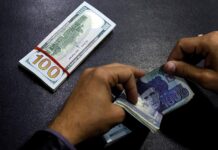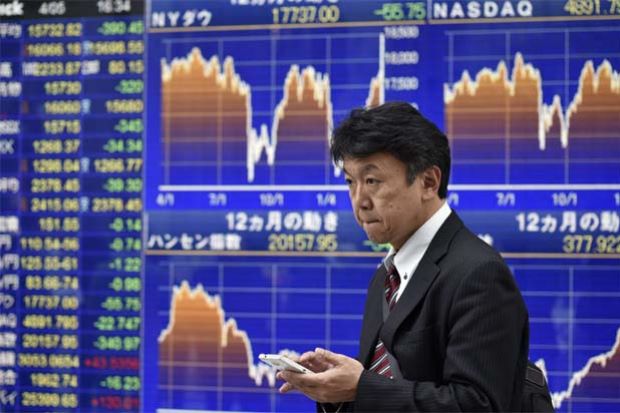Tokyo: Asian shares slumped on Wednesday after Wall Street was knocked hard in the wake of a delay to a U.S. healthcare reform vote, while the euro rallied after European Central Bank President Mario Draghi hinted that the ECB could trim its stimulus this year.
MSCI’s broadest index of Asia-Pacific shares outside Japan was down 0.4 percent, pulling further away from more than two-year highs probed earlier this week. On Monday, it touched its highest level since May 2015
“We’ve had a pretty good run,” said Sean Darby, chief global equity strategist at Jefferies. “I suspect what people have owned has done very well, and they want to sell some of those positions.”
Japan’s Nikkei share average slipped 0.3 percent, facing headwinds from the dollar’s reversal of its rise against the yen. But the banking and insurance sectors outperformed on expectations of higher rates.
The yield on U.S. Benchmark 10-year Treasury notes stood at 2.198 percent in Asian trading, flat from its U.S. close on Tuesday and above 2.14 percent late on Monday after Federal Reserve chief Janet Yellen said that it is appropriate to gradually raise rates.
“Yellen’s comment is supporting Japanese financial stocks today, and for the long-term, Japanese stocks are on the rising trend supported by U.S.-led global economic recovery,” said Mutsumi Kagawa, chief global strategist at Rakuten Securities.
On Tuesday, the benchmark S&P 500 posted its biggest one-day drop in about six weeks and closed at its lowest point since May 31, after the U.S. Senate’s move to delay voting on a healthcare reform bill rekindled worries on the timeline for President Donald Trump’s business-friendly policies.
U.S. stocks accelerated their losses after Senate Republican leader Mitch McConnell decided to put off a planned vote on a bill to dismantle the Affordable Care Act until after the Senate’s July 4 recess, to get more time to garner sufficient votes for its passage.
Against the perceived safe-haven yen, the dollar slipped 0.3 percent to 112.090 after rising as high as 112.285 yen, its highest since May 17.
The dollar index, which gauges the U.S. currency against a basket of six major counterparts, edged down slightly on the day to 96.365, well below its previous session high of 97.447.
The euro was up 0.4 percent at $1.13480 after rising to a 10-month high of $1.1356 after Draghi, speaking to a conference in Portugal, said the ECB could adjust its policy tools as economic prospects improve in Europe.
Some strategists said that once the dust settled from the impact of his comments, the euro could give back some of its gains.
“To me, it seems the change in policy will not be very substantial, so I think in the coming days, ECB officials will try to water down Draghi’s comments,” said Masafumi Yamamoto, chief forex strategist at Mizuho Securities in Tokyo.
Crude oil futures steadied after their overnight surge. Prices rose nearly 2 percent on Tuesday on the weaker dollar, short-covering and expectations that U.S. crude inventories might decline for a third consecutive week.
Brent crude futures edged up slightly on the day to$46.66 per barrel. U.S. crude futures were down 0.2 percent at $44.14.
The weaker dollar helped bolster spot gold, which was up 0.4 percent at 1,252.50 per ounce
























